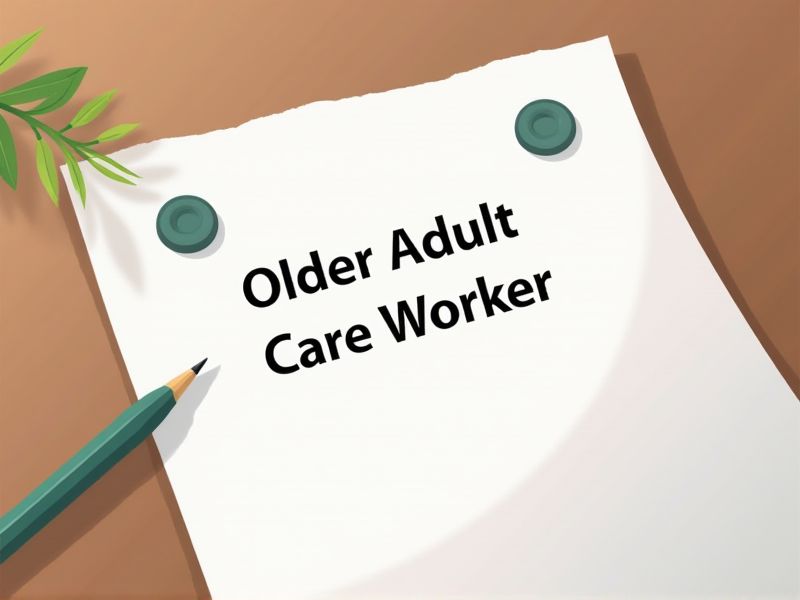
Older adult care workers are responsible for meeting the unique physical and emotional needs of elderly clients. Certifications ensure that workers possess the necessary skills and knowledge to provide safe, effective, and compassionate care. These certifications also serve to build trust with families, who rely on them to safeguard their loved ones' wellbeing. Here are some vital certifications required for an older adult care worker.
Certified Nursing Assistant (CNA)
The increasing aging population leads to a growing demand for Certified Nursing Assistants (CNAs) to provide essential support for older adult care. CNAs help manage daily living activities, such as bathing and feeding, which promotes the quality of life for elderly individuals. Their training in monitoring vital signs ensures timely detection of health issues, preventing potential complications. Emotional and social support from CNAs plays a crucial role in reducing feelings of isolation and depression among older adults.
Home Health Aide (HHA) Certification
Obtaining a Home Health Aide (HHA) Certification ensures that caregivers possess essential skills in personal care, medical support, and emergency response, directly impacting the quality of care provided to older adults. Certified HHAs are equipped to administer medication safely, reducing the risk of errors in an older adult's medication regimen. Certification often includes training in communication and empathy, facilitating better rapport between caregivers and clients, which can improve mental health outcomes for seniors. Regulatory compliance requires formal certification to meet state and federal guidelines, which is crucial for maintaining employment and operational standards in the healthcare industry.
CPR and First Aid Certification
CPR and First Aid Certification ensures older adult care workers can respond effectively to medical emergencies, such as cardiac arrests, which are more prevalent among the elderly. Trained caregivers can reduce the severity of falls and injuries, as they are skilled in stabilizing and assessing injuries. Certified workers enhance the overall safety environment within care facilities, encouraging trust from families and relatives. Certification requirements also promote continual learning, keeping workers updated on the best practices for emergency response.
Certified Medication Aide (CMA)
The rise in chronic conditions among older adults creates a pressing need for medication management, which a Certified Medication Aide (CMA) can effectively address. CMAs reduce medication errors through precise distribution, minimizing potential health risks for seniors. Their training in monitoring side effects enhances patient safety, ensuring timely interventions when issues arise. Increasing life expectancy amplifies the demand for skilled professionals, making CMAs integral to quality care for the aging population.
Certified Dementia Practitioner (CDP)
The presence of a Certified Dementia Practitioner (CDP) in older adult care ensures specialized knowledge in managing dementia-related behaviors, enhancing the quality of life for those affected. This certification equips care workers with evidence-based techniques, reducing the risk of errors and improving patient safety. Enhanced communication skills gained through CDP training can lead to more effective interactions with both patients and their families, fostering a supportive environment. Recognizing early symptoms and appropriate interventions can potentially slow the progression of dementia and improve overall care outcomes.
Certified Geriatric Care Manager (GCM)
A Certified Geriatric Care Manager provides specialized care coordination and expertise in managing the unique health challenges faced by older adults. Their in-depth knowledge allows them to create and implement personalized care plans, which significantly improve the quality of life for older adults. By overseeing and adjusting care plans as older adults' needs change, GCMs help prevent issues that may arise from inadequate or inappropriate care. Furthermore, they serve as crucial advocates, navigating complex healthcare systems and resources to ensure the elderly receive the necessary support and services.
Certified Caregiver Credential (CCC)
The Certified Caregiver Credential (CCC) ensures that caregivers possess the necessary skills and knowledge for effective older adult care, enhancing the quality and reliability of services. It increases trust among families and institutions, leading to higher employment opportunities for certified caregivers. Regulatory requirements and an aging population drive demand for standardized qualifications like the CCC, which address potential caregiver shortages. Ensuring caregivers are properly credentialed minimizes risks associated with improper elderly care, improving overall patient outcomes and safety.
Geriatric First Aid Certification
Geriatric First Aid Certification equips care workers with the skills to address the unique medical needs of older adults, improving emergency response outcomes. As age-related health issues and chronic conditions are prevalent, certification ensures care workers can effectively manage sudden medical situations. Accurate first aid knowledge reduces the risk of complications from falls or cardiovascular events, which are common among the elderly. Employers often recognize the certification as a mark of professionalism, enhancing job prospects and trust in care quality.
Alzheimer's Disease Care Certification
Alzheimer's Disease Care Certification equips care workers with specialized knowledge to manage the unique challenges associated with the disease. It enhances the quality of care, ensuring that the individual's cognitive and emotional needs are met effectively. Certified workers are better prepared to recognize early symptoms, resulting in timely interventions that can improve patient outcomes. Certification fosters a standardized approach, reducing variability in care and increasing trust among the families of those affected.
Elder Abuse Prevention and Intervention Certification
The Elder Abuse Prevention and Intervention Certification equips care workers with the knowledge to identify signs of abuse effectively, reducing its prevalence among older adults. By enhancing skills in intervention strategies, this certification ensures timely and appropriate responses, safeguarding against further harm. Awareness and education through certification increase the accountability and ethical standards among caregivers, fostering a safer environment for older adults. Accredited training programs translate into heightened trust and confidence from families relying on care services for their elderly loved ones.
Summary
By obtaining certifications, you can enhance your credibility and gain trust from both clients and employers. This formal recognition often leads to increased job opportunities and potentially higher salaries. You may also find yourself with a greater sense of job satisfaction as you apply new skills and knowledge. Certification can improve the quality of care you provide, positively impacting the well-being of older adults.
